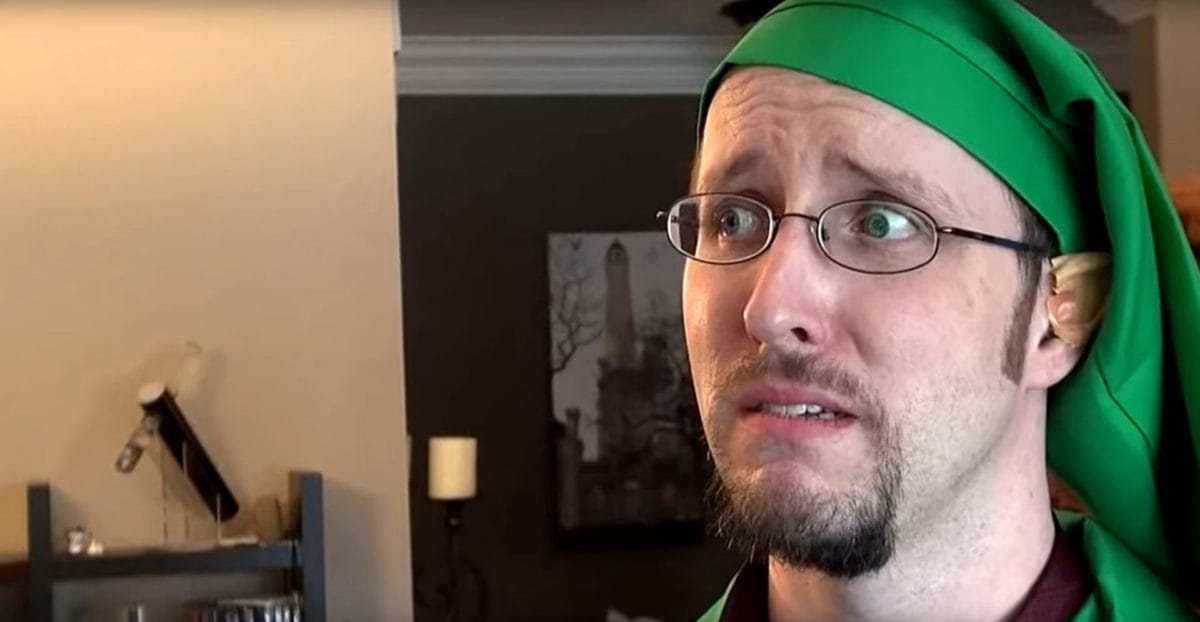By Christopher Sloce
From bedroom pop to Tommy Wiseau, amateurism in pop culture carries its own charm. If there’s any reason the amateurism of Doug Walker invites so much fascination, it’s because of how much Walker curdled that natural charm by creating some of the worst, most uniquely nasty films ever made. Films so infamous they turned a popular internet reviewer into a reviled piece of internet lore–Grendel wearing a red tie and a white t-shirt.
Despite Walker’s inability to write a joke, he initially rose to fame for a web comedy series called The Nostalgia Critic he created in 2007. Walker, as adept at acting as he was at all things comical, starred as the titular character. The series, however, had one thing going for it: late aughts internet video consumers needed an angry guy who screeched at cartoons to go along with their angry guys who yelled at video games.
Walker settled into a then-fertile niche, simultaneously pushing 80s & 90s nostalgia, faux-outrage, and jokes so Reddit-y they’d make even the surliest narwhal bacon at midnight. Doug Walker was our Nostalgia Critic not because he was uniquely charismatic or insightful, but because his nostalgia was our nostalgia. He remembered it so we didn’t have to.
What kept Doug from falling by the cultural wayside, compared to other angry Internet reviewers, was ambition. A hit web series wasn’t enough.
Walker founded a video hub of internet reviewers called That Guy With the Glasses (which eventually became Channel Awesome). The site hosted reviewers of various media formats, but mostly promoted The Nostalgia Critic and Doug Walker’s other projects like Bum Reviews and Ask That Guy With the Glasses.
Walker celebrated the site’s first anniversary innocently enough, with a crossover episode featuring his kayfabe rival, the Angry Video Game Nerd. The battle between the Nostalgia Critic and the Nerd became pitched as a battle between Gamers and Critics. This sort of small-fry fanservice internet video is cringey, but over in twenty minutes.
The next year, Walker rang in the site’s anniversary with a full-length movie, Kickassia (2010) . Two more, Suburban Knights (2011) and To Boldly Flee (2012), would follow. It was this trilogy that would lead to Doug’s legend, a legend that includes his fall from such great heights, when his former collaborators released an open letter called “Not So Awesome”, detailing the alleged incompetence and horrible business culture of Channel Awesome. Suddenly, the movies weren’t just cringe. They were evidence.
The idea of stretching internet nerd humor to feature-length proportions isn’t a good one. Nor is attempting to fit nearly the entire Channel Awesome team–a fighting game roster’s worth of critics–into a movie. But what makes these films unique aren’t the Spirit Halloween costumes, the abysmal cinematography, or even the scenes that go on forever because we have to get everybody to say a line.
What makes the “Anniversary Trilogy” unique is the palpable nastiness even Channel Awesome neophytes can recognize. The film’s inherent cruelty and the culture of the internet at the time complement each other. Doug Walker’s films prophesize a downfall in the same internet where you could make a website called EmmaWatsonLegalityCountdown.com and still keep your job as a Blockbuster clerk that paid $50k a year with benefits.
Despite the billing as a “trilogy”, it’s easier to understand the Anniversary Trilogy as one film (Kickassia) followed by a duology (Suburban Knights and To Boldly Flee). Kickassia is the Duck Soup riff where the Nostalgia Critic assembles an army of his fellow Channel Awesome critics and invades a micronation. In a prophetic twist, the Critic grows mad with power and the Channel Awesome underlings revolt.
The duology of Knights and Flee, on the other hand, is a fantasy sci-fi epic that goes from the Chicago suburbs to the stars. It’s Knights and Flee that solidified Doug’s infamy. Kickassia is a trifle: a bad comedy full of bad thank you to the fans jokes, but grounded. Perhaps Kickassia could have been an absurd flight of fun for loyal viewers, but it didn’t deserve to kick off an actual set of movies with resonance and plot.
It’d be an abject failure for me to try and recreate the plot of Suburban Knights and To Boldly Flee. Plots get called well-oiled machines, but these feel like a Seiko movement gummed up with weed resin. Things might move, but slowly it’s slow, and you ask why the fuck it happened in the first place. In fact, the reviewers and actors could have used something to slow the time: the stress of the shoots of both films was a contributing factor to Channel Awesome’s destruction, with To Boldly Flee, a 3.5 hour movie, being shot in less than a week. Return of the King took, roughly, a year and a half to shoot. It won an Oscar, too, even though the Dougs of the world would tell you it had 8 billion endings.
Rather than the plot, it makes more sense to talk about the villains. Each film is an attempt at an epic (an Epic epic, if you will).
In Knights, the reviewers are searching for a gauntlet that contains the source for all the world’s magic. In their way is Malachite, a sorcerer who despises the 21st century and technology. Whatever kind of sorcerer wears a black leather duster channeling The Matrix and a black fedora is beyond me, but this one also talks like Ted Kacynzski when he discusses the modern world. His plan is to destroy all technology in order to create a new reign of magic, and he needs the gauntlet to do it.
In To Boldly Flee, the forces of studio greed and the Stop Online Piracy Act are poured together in a Star Wars mold with a dash of Doug Walker’s belabored General Zod impression . For Channel Awesome and the internet, SOPA was a legitimate threat. However, nothing could date it more with the stink of 2011 and 2012 than comparing it to Darth Vader. Yet that comparison is why we see so much value in the films: for better or for worse, they are a landmark of internet folkways.
But these are epics about saving the world, including the internet. Any story about saving the world requires something worth preserving, and Doug’s view of the world is as shallow as his criticism. When the gang defends the 21st century in Suburban Knights, it’s the 21st century of stuff and consuming stuff. The technology they’re defending isn’t what’s vital and life-improving. And the hubbub around SOPA in To Boldly Flee was entirely about whether the reviewers would be protected under the Fair Use and satire laws.
What the gang defends is the internet of “The Cake is a Lie” and Bane impressions. The gang fights for a culture that couldn’t determine whether it should be a haven for a certain kind of disaffected male outcast or one for everybody–with all the clichés of nerd-dom subject to criticism. That pre-Gamergate glow is all over the films, where adhering to everything that kicks ass is more important than anybody’s feelings about how they’re treated. That’s not praise. That means there’s epic badass girl jokes about women who aren’t like other girls because they shoot machine guns (“Strangely hot,” comments Angry Joe). That also means we get a bunch of jokes about a guy named Jewwario (the past was another country, my friends) wearing the codpiece from Labyrinth, causing his female co-reviewers to fawn over the outline of his hog.
If there’s any moment that typifies the sort of splits that caused Gamergate in the series, it’s when Doug shoehorned in a rape joke into To Boldly Flee. Both Lindsay Ellis (then known as the Nostalgia Chick) and Lewis Lovhaug (then and now known by his reviewer name Linkara) protested that it made them uncomfortable to act out as both friends and coworkers. This conflict came after Doug tried to get Lindsay to play a character named 60 of 9. You’d think that somebody at any point would step back and realize, after complaining about movies as their jobs, how all of this odd sex stuff would play (especially considering some of the specific discussions in the “Not So Awesome” document about the website’s issue with sexual harassment, including some gravely serious allegations that were revealed to involve the aforementioned Jewwario). But to quote another salaciously named film character: “The truth is, these are not very bright guys, and things got out of hand.” That fits Doug and his producer’s approach to film-making well enough, but the approach to their female characters and co-workers in the films feels less like “things getting out of hand” and more like the same old. Some world to save.
That’s one of many reasons the ending of To Boldy Flee doesn’t play. After a number of plot contrivances (one cheekily named the Plot Hole, which works as a sort of an plot inconsistency-based black hole), the Nostalgia Critic winds up meeting his creator Doug Walker in our world, who gives him some rigmarole about how he’s changed as a character from his selfish beginnings, having “taken on a life of his own”. Doug the creator gives Doug the creation a choice: because Doug is currently in the process of writing To Boldly Flee, in order to know what will happen in the film, all the Nostalgia Critic has to do is act, and something will happen in the film. But the Critic can also choose to enter the real world, where: “there is a world that has no structure, no plot, no story arcs, no themes, no purpose…out there, you’ll be the dealer of your own destiny. Everybody’s future is unknown. Just reality, the great mystery.” But the exchange comes with a price: if the Critic leaves and stays in the real world, the “reviewer world” will go away forever. In a moment of Christ-like foresight, the Critic merges with the Plot Hole, reversing the apocalyptic events of the entire film, and proving the life-like nature of Doug’s own creation, which is pretty convenient for Doug to declare in a film he’s directing. It’s only after he gives everyone the secret to expanding the plot hole (pointing out a number of inconsistencies in any number of comics, video games, movies, etc) that he can merge with the Plot Hole. Because Doug so loves the world of stuff, he gives his only begotten creation–the Nostalgia Critic–so that whosoever believes in his bean-counting approach to criticism should not perish
The world that produced Doug–one rife with unfounded optimism, particularly around technology–was foolhardy about the limits of cyberspace. John Perry Barlow’s “A Declaration of the Independence of Cyberspace” claimed: “Cyberspace does not lie within your borders. Do not think that you can build it…You cannot. It is an act of nature and it grows itself through our collective actions.”
This sort of communal tech optimism undergirds these films. In Suburban Knights, when they meet the ghost of the nerd who created the map to the gauntlet, he calls the Internet “that Defense Department bullshit.” But now, the reviewers gleefully tell the nerd, it’s a different place: “a place to bitch about useless shit”, “a place to purchase mail order brides” and “for porn.” When it’s time for the Critic to give his St. Crispin’s Day speech, his defense is , “Sure, we may have abused science. Really abused it! But that doesn’t mean we still can’t learn from it! There may be no more shows when the age of technology comes crashing down! But it is not this day! This day we fight!
John Perry Barlow’s “Declaration” was a rejoinder to the Telecommunications Act of 1996. This legislation regulated internet communications, opening it up to commerce. The act also deregulated traditional media, leading to a world of Sinclairs and Clear Channels (which was always its real purpose). That law opened the internet for business. Just as the Homestead Act opened up the frontier to American capital. The libertarian myth of cyberspace and the “frontier” always come after said “frontier” was primed to make money. In the gold rush, it’s easy to think the prime movers of history are Jeffersonian yeoman farmers like Doug Walker–just a guy with glasses, after all. But Chuck Jaffers calling the internet “Defense Department bullshit” is more instructive than what the nerds and John Perry Barlow thought of it. They all might think the internet is built through collective actions, but the people who make money off it never have, and never will, and Channel Awesome were willing to push people in whatever ways possible when it came to making that money.
At the end of To Boldly Flee, Doug’s sacrifice maintains the reviewer’s reality. In reality, his failure is just like that sacrifice. There’s a little bit of Doug all over the internet, from the format of “YouTube reviewers” and “Commentary channels” to Elon Musk’s Twitter-purchasing fiasco. The end of To Boldly Flee was supposed to be an end to the Critic, as well, as he tried new things, like an instant-failure web series called Demo Reel. But in the end, it’s a business, and he wound up donning the Nostalgia Critic’s t-shirt and tie once again.
Today, the Critic continues, but when you go to channelawesome.com, it redirects to a familiar place, one Doug never would have imagined himself. Now, you can only watch Channel Awesome on YouTube, owned by Google. 

